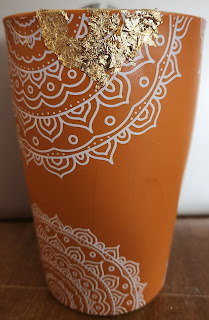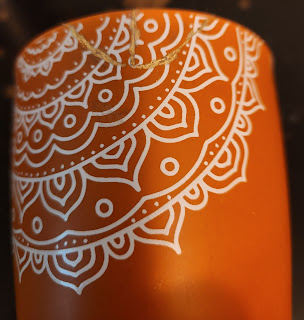Blasphemous but true: I have become more of a tea drinker than coffee. Specifically, I love Scottish Breakfast tea – and not only at breakfast.
I like to brew it in one of these:
Recently another of my favorite cups broke. It was a smooth break with two broken chips that fitted easily together and back in the cup.
I decided to pursue how to
put it back together with gold seams as I have seen done online so I started to
research.
The philosophy behind Kintsugi can be thought of as – a variant of the adage ‘waste not want not’. It is also said to encompass other Japanese concepts such as ‘no mind’ or non-attachment or acceptance of change or fate.
Amongst the ideas that explain Kintsugi, the one that means the most to me is Wabi Sabi which means ‘admiring imperfection’ or ‘beauty within imperfection”.
Many moons ago I was in a relationship with a Navajo man who taught me a lot about beauty because it is deeply entrenched in the Navajo’s view of the world.
Navajo’s have an ancient
concept called ‘Hozho’ which roughly translates as balance and beauty. Their
culture recognizes that beauty can be visual as in beautiful people or objects but
it also takes in much that is beyond the five senses.
Beauty can be seen in
relationships and health and goodness and in rituals and ceremonies.
Being respectful of other cultures, I think that the Navajo concept of ‘Hozho’ combines the Japanese concepts of ‘Wabi Sabi’ and ‘Yuugen’ or beholding beauty in the unseen.
From the Daily Sabah* –
Big in Japan: 10 Japanese concepts to live by
Ikigai: A reason for being
(This idea is spoken of in several documentaries about longevity and the Blue Zones of the world; sometimes by name and other times unnamed by meaning. Centenarians generally have a specific purpose or reason for being in their life.
I recently read of a woman named Colette Maze who is 109 years old. She’s a pianist and she just released her seventh album. She started playing at age five which means she has played piano for 104 years. That seems like a definite reason or purpose for living.)
Oubaitori: Never comparing oneself
Kaizen: continuous improvement
Wabi-sabi: Admiring
imperfection
Mottainai: the concept of not being wasteful
Kintsugi: the art of
golden repair
Gaman: Dignity during duress
Shikata ga nai: Acceptance and letting go
Yuugen: Beholding beauty in the unseen
Mono no aware: the pathos of things (having empathy towards things and ephemera)
*The Daily Sabah is a Turkish pro-government daily newspaper published in Turkey and available online in other languages.







No comments:
Post a Comment